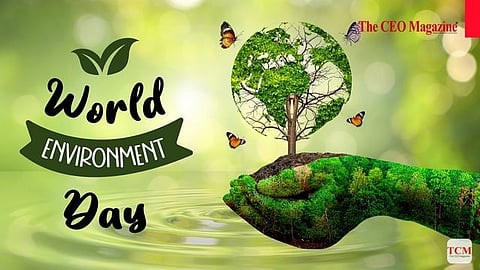

World Environment Day 2024
Uniting for a Sustainable Future
Every year on June 5th, people around the globe come together to celebrate World Environment Day, a day dedicated to raising awareness and taking action on pressing environmental issues. Since its inception in 1973, it has served as a catalyst for addressing pressing issues like marine pollution, overpopulation, global warming, sustainable development and wildlife crime.
Each year, this global platform provides a thematic framework for diverse stakeholders—from businesses and NGOs to communities and public figures—to advocate for environmental causes, underscoring the imperative of collective action in nurturing a sustainable future for generations to come.
Every year, World Environment Day spotlights an important environmental topic. Past themes have included protecting wildlife and using resources wisely. This year, the theme is “Land restoration, stopping desertification, and drought resilience.”
Land restoration, stopping desertification, and drought resilience
Moreover, the host of this year's editions is the Kingdom of Saudi Arabia. With a spotlight on these pressing environmental challenges, this year's event underscores the significance of concerted global efforts to combat ecological degradation.
As a key pillar of the UN Decade on Ecosystem Restoration (2021-2030), the focus on land restoration serves as a unifying call for the preservation and revitalisation of ecosystems worldwide. This initiative is vital not only for safeguarding biodiversity but also for advancing progress towards the Sustainable Development Goals.
By prioritising land restoration and resilience-building measures, World Environment Day 2024 aims to galvanise action and foster a more sustainable future for generations to come.
World Environment Day is a significant global observance that underscores the paramount importance of environmental conservation and sustainability. This annual event poignantly reminds us of the urgent need to address pressing environmental challenges faced by our planet.
Through various initiatives, campaigns, and educational programs, World Environment Day raises awareness about critical issues such as climate change, biodiversity loss, pollution, and habitat destruction. It also fosters a sense of collective responsibility and encourages individuals, communities, governments, and organisations worldwide to take proactive measures to protect and preserve the environment.
By promoting sustainable practices, advocating for policy changes, and fostering eco-friendly lifestyles, World Environment Day plays a vital role in shaping a greener, healthier, and more resilient future for generations to come.
The world confronts a multitude of environmental challenges, spanning from deforestation and pollution to climate change and biodiversity loss. World Environment Day serves as a crucial platform to raise awareness about these challenges and to mobilise action to combat them.
Here are some of the Global challenges that need to be addressed immediately:
Climate Change
One of the most pressing global challenges, climate change is altering weather patterns, causing rising temperatures, melting ice caps, and more frequent extreme weather events. It poses significant threats to ecosystems, food security, water resources, and human health.
Biodiversity loss is occurring at an alarming rate due to habitat destruction, pollution, overexploitation of natural resources, and climate change. This loss undermines ecosystem resilience and threatens the survival of countless species.
Global Health Pandemics
Recent events, such as the COVID-19 pandemic, have highlighted the interconnectedness of global health systems and the vulnerability of populations to infectious diseases. Addressing global health challenges requires international cooperation, robust healthcare infrastructure, and effective strategies to prevent, detect, and respond to outbreaks.
Poverty remains a persistent global challenge, with millions of people worldwide lacking access to adequate food, clean water, healthcare, education, and economic opportunities. Economic inequality exacerbates social tensions, undermines stability, and hinders sustainable development efforts.
Environmental Degradation
Pollution, deforestation, land degradation, and ocean acidification are among the forms of environmental degradation that threaten ecosystems, biodiversity, and human health. Mitigating these impacts requires concerted efforts to promote sustainable consumption and production patterns, conserve natural resources, and reduce pollution.
Therefore, addressing these global challenges requires collective action, collaboration, and innovative solutions at local, national, and international levels.
World Environment Day is not just about raising awareness; it is also about taking concrete action to protect and preserve the environment. Individuals and communities can contribute to this effort in various ways:
Planting Trees
Organise tree planting events in local communities to increase green cover and combat deforestation.
Promote recycling programs and educate communities about the importance of recycling materials such as paper, plastic, glass, and metal.
Energy conservation
Raise awareness about energy conservation practices such as using energy-efficient appliances, turning off lights when not in use, and reducing air conditioning and heating usage.
Educate communities about the importance of water conservation and encourage practices such as fixing leaks, using water-saving appliances, and reducing water usage.
Education and awareness
Organise workshops, seminars, and educational events to raise awareness about environmental issues and promote sustainable living practices.
These are just a few initiatives that individuals and communities can undertake on World Environment Day to protect and preserve our planet for future generations.
As we commemorate World Environment Day 2024, let us reaffirm our commitment to environmental conservation and sustainability. Together, let us strive to build a greener, healthier, and more resilient future for generations to come. Through collective action and unwavering dedication, we can overcome the challenges that lie ahead and create a world where nature thrives, and all life flourishes.
Follow us on Google News
